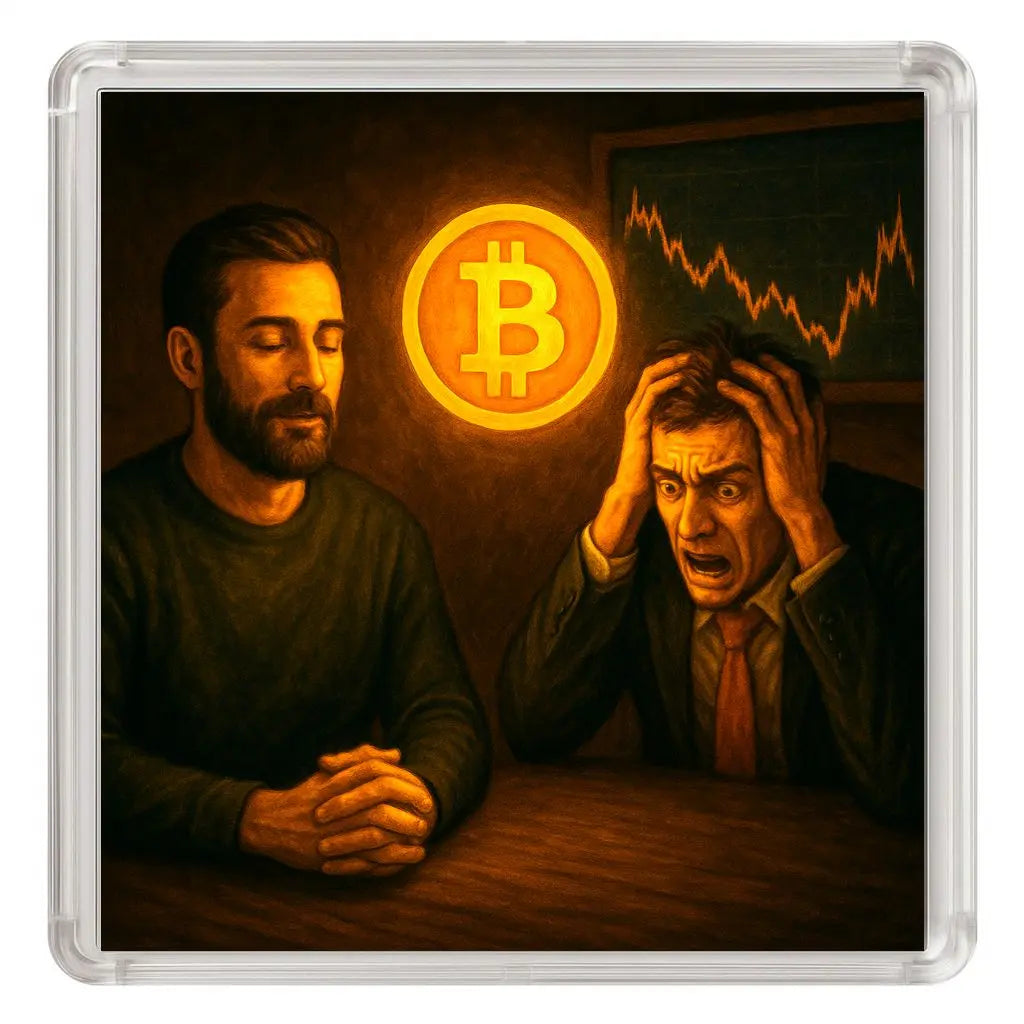
THE CLASH OF EMOTIONS: HODLER VS TRADER
Share
The world of Bitcoin isn't just about code, technology, and numbers. It's above all a psychological arena where two profiles intersect, size each other up, and clash. On one side, the trader, feverish, glued to his screens, fueled by charts and adrenaline. On the other, the hodler, calm, silent, almost absent from the noise of the market. This duel isn't technical. It's a clash of emotions, a struggle between two ways of experiencing time, two visions of freedom.
The trader lives in the moment. His breathing follows the green and red candles that follow one another on the screen. With each pump, his heart races, he believes he has taken his revenge on life, he already sees himself rich, free, at the top. But with each sudden fall, fear invades him, sweat beads on his forehead, he doubts, he panics, he sells. Then he regrets it, he tries to catch the movement, but the market is already slipping away from him. His nights are broken, his mind exhausted, his portfolio battered by his own emotions. The trader doesn't confront the market. He confronts himself, constantly. He is a prisoner of his reactions.
The hodler, on the other hand, knows a different tempo. He doesn't seek to beat the market, he doesn't believe in perfect prediction. He doesn't need to watch the screen every hour. He knows the market is a choppy sea, but he has chosen a course and he sticks to it. Where the trader experiences fear and greed in an endless cycle, the hodler lives with patience and discipline. He understands that time is his ally. His wallet is not a casino, but a vault. Each accumulated satoshi is a stone laid in the foundations of his freedom.
This contrast isn't just financial. It's a mirror of our societies. The trader's impatience reflects the modern world, saturated with notifications, requests, and immediate bets. Everything must be fast, intense, and instantaneous. We consume adrenaline like we consume sugar: in excess, to the point of exhaustion. The hodler, on the other hand, embodies a silent rebellion against this short-term dictate. He rejects easy dopamine. He chooses scarcity, duration, and vision. He lives within a broader horizon, one where Bitcoin is not a game, but a weapon of sovereignty.
Imagine two individuals. The first sold his bitcoins in a panic in 2013, in 2017, in 2021. Each time, he thought he was smart to take his profits. But today, he looks at the current price and bites his fingers. Each sale was a short-term victory, but a long-term defeat. The second sold nothing. He absorbed the corrections, he gritted his teeth during the declines, he absorbed the scorn, the mockery, the “Bitcoin is dead” repeated by the media. He held on. Today, he is richer not only in bitcoin, but in confidence, in lucidity. What he has gained exceeds the value of his portfolio: he has gained control of his emotions.
The clash between the trader and the hodler is the clash between two psychologies. Fear versus patience. Frenzy versus consistency. The short term versus the long term. And this battle isn't just playing out in the markets, but in our daily lives. Are we traders of our existence, running from one distraction to another, selling our energy too quickly, exhausted by permanent volatility? Or are we hodlers of our time, capable of building, accumulating, resisting, and maintaining a vision when everything around us screams panic?
Bitcoin isn't just a currency. It's a school of emotions. Those who learn to hodl also learn to free themselves from the short term. They discover the power of consistency. They realize that the real enemy isn't the volatility of the market, but the instability of their own mind. The market doesn't need to defeat them; it defeats itself every time they give in to fear or greed.
This is why so many traders end up ruined even after they've survived bull markets. Because they failed to hold on. They sold too early, bought back too late, panicked when they should have waited, and exulted when they should have remained sober. The hodler, on the other hand, appears to be doing nothing. But within this "doing nothing" lies a superhuman discipline. Don't give in, don't touch, don't get sucked in. The hodler builds an invisible wall that protects him from chaos.
This duel between hodler and trader is a parable. In a world where everything pushes us to act urgently, the hodler embodies the ultimate resistance: remaining motionless when everything trembles. His inertia is not weakness, it is strength. His silence is not passivity, it is mastery. He is the reminder that freedom is not won by a stroke of luck, but by a series of simple, repeated, constant actions. Buy, hold, secure. And start again.
The trader believes he lives intensely. The hodler lives deeply. The trader seeks thrills. The hodler builds a fortress. The trader chases the illusion of beating the market. The hodler aligns himself with one truth: no one beats time.
In this clash of emotions, everyone chooses sides. Either you live trapped in the short term, oscillating between euphoria and despair, or you learn to master the only thing you truly possess: your time and your patience. Bitcoin doesn't reward the brightest or the fastest, but the most consistent. It rewards those who know how to wait.
A day will come when the noise of the traders will have died away, swallowed up in the market archives. But the hodlers will still be there, serene, free, sovereign, sitting on the pedestal of their patience. Because they will have understood what others have never seen: in a world that is changing at breakneck speed, the greatest victory is to remain immutable.
👉 Also read:
